Medical-legal partnership is a flexible intervention that can be adapted to meet the unique needs of different populations. A new fact sheet series from the National Center for Medical-Legal Partnership highlights specific ways MLPs can help meet the needs of socially vulnerable older adults, youth, transgender individuals, people experiencing homelessness, and people with complex health needs.
Socially vulnerable older adults and medical-legal partnerships
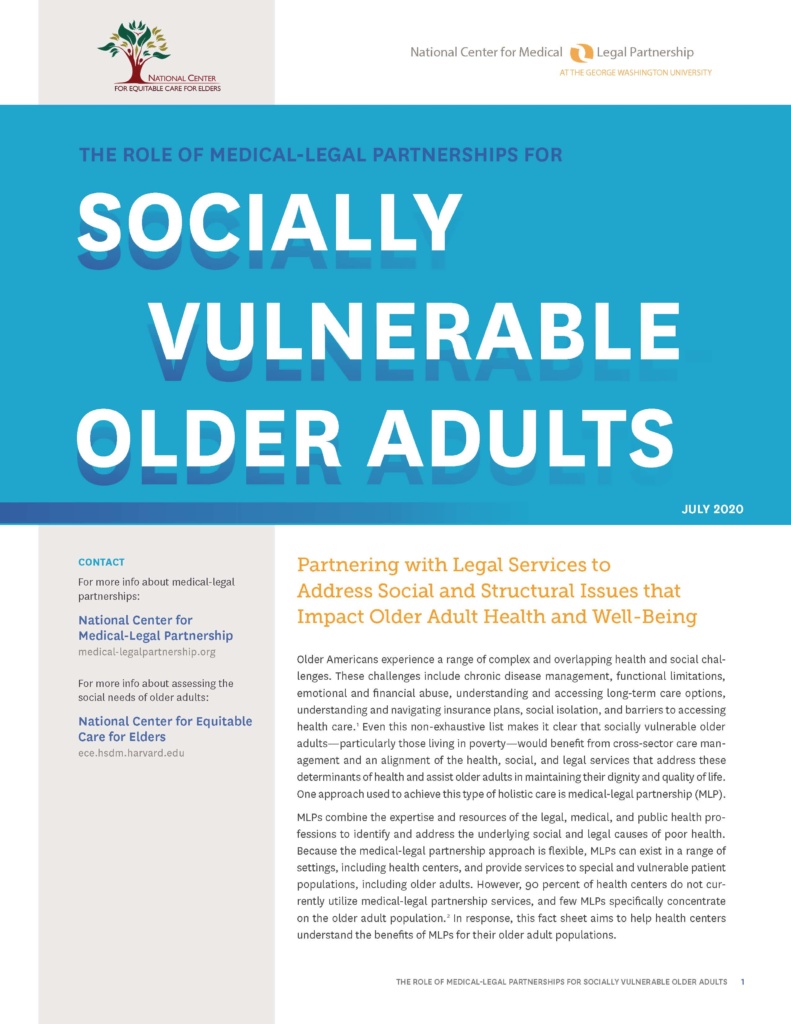 By National Center for Medical-Legal Partnership & National Center for Equitable Care for Elders
By National Center for Medical-Legal Partnership & National Center for Equitable Care for Elders
Read the full fact sheet, “The Role of Medical-Legal Partnerships for Socially Vulnerable Older Adults”
July 2020
Older Americans experience a range of complex and overlapping health and social challenges. These challenges include chronic disease management, functional limitations, emotional and financial abuse, understanding and accessing long-term care options, understanding and navigating insurance plans, social isolation, and barriers to accessing health care. This fact sheet looks at how integrating medical and legal services for older health center patients can help mitigate these challenges and begin to comprehensively address problems that directly impact a patient’s health and well-being. It examines how these partnerships work, and highlights two medical-legal partnership programs for seniors in San Francisco and Boston.
Complex care health settings and medical-legal partnerships
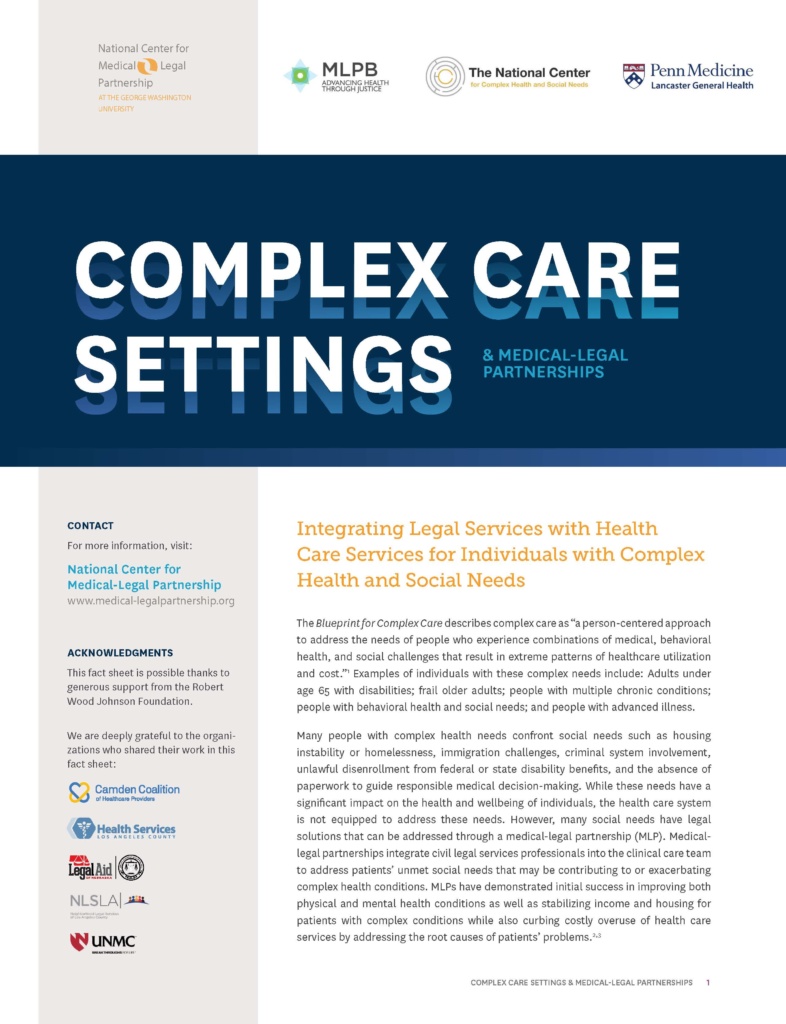 By MLPB, National Center for Complex Health and Social Needs, National Center for Medical-Legal Partnership & PennMedicine Lancaster General Health
By MLPB, National Center for Complex Health and Social Needs, National Center for Medical-Legal Partnership & PennMedicine Lancaster General Health
Read the full fact sheet, “Complex Care Settings and Medical-Legal Partnerships”
February 2019
Many people with complex health needs confront social needs such as housing instability or homelessness, immigration challenges, criminal system involvement, unlawful disenrollment from federal or state disability benefits, and the absence of paperwork to guide responsible medical decision-making. While these needs have a significant impact on the health and wellbeing of individuals, the health care system is not equipped to address these needs. However, many social needs have legal solutions. This fact sheet describes five complex care settings that have integrated medical-legal partnership services into care delivery. It also features data on the ways these partnerships have demonstrated initial success in improving both physical and mental health conditions as well as stabilizing income and housing for patients with complex conditions while also curbing costly overuse of health care services by addressing the root causes of patients’ problems.
Homelessness, health, and medical-legal partnerships
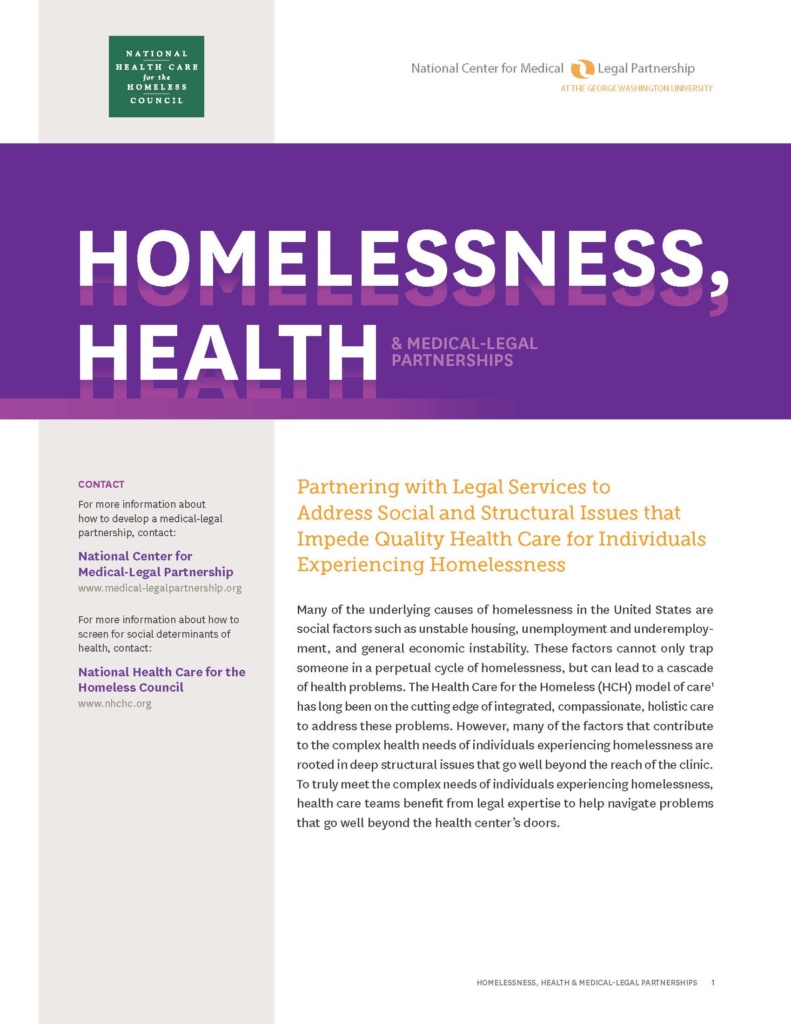 By National Center for Medical-Legal Partnership & National Health Care for the Homeless Council
By National Center for Medical-Legal Partnership & National Health Care for the Homeless Council
Read the full fact sheet, “Homelessness, Health, and Medical-Legal Partnerships”
October 2018
Many of the underlying causes of homelessness are social factors such as unstable housing, unemployment and underemployment, and general economic instability. These factors cannot only trap someone in a perpetual cycle of homelessness, but can lead to a cascade of health problems. To truly meet the complex needs of individuals experiencing homelessness, health care teams benefit from legal expertise to help navigate problems that go well beyond the clinic’s doors. This fact sheet describes common social and legal needs that affect the health of homeless individuals, and ways integrated legal services can help meet those needs. It includes data from a study in Connecticut and New York City highlighting the housing and mental health benefits of MLP services for homeless veterans.
Transgender health and medical-legal partnerships
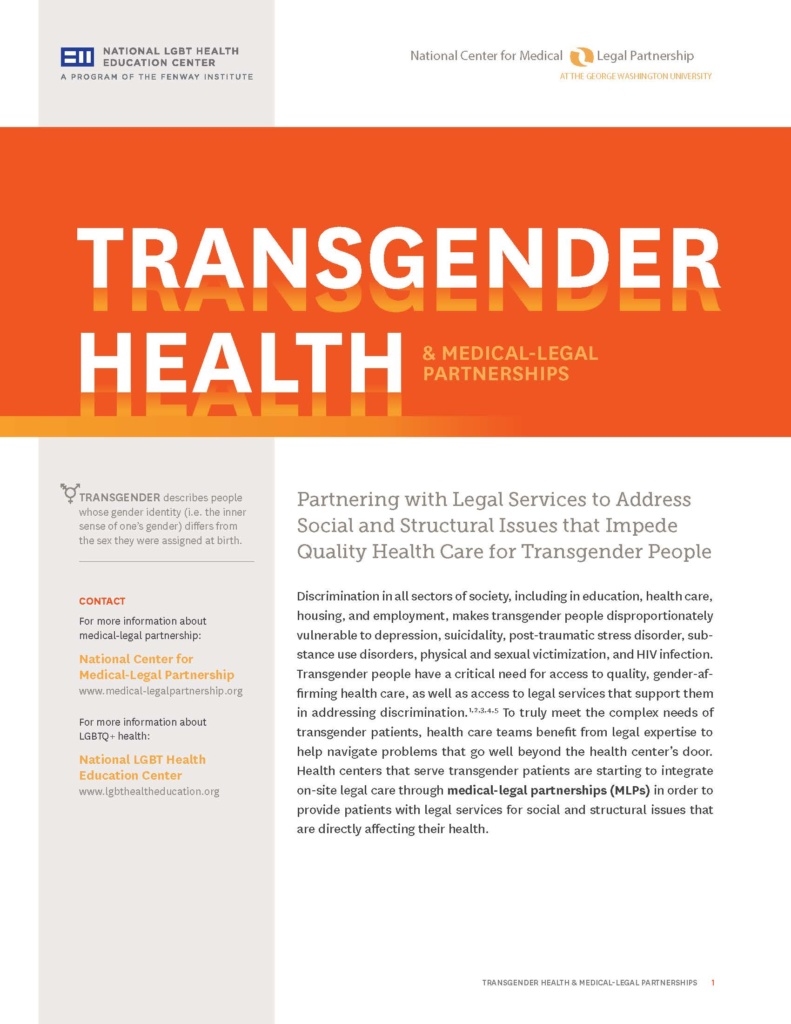 By National Center for Medical-Legal Partnership & National LGBT Health Education Center
By National Center for Medical-Legal Partnership & National LGBT Health Education Center
Read the full fact, “Transgender Health and Medical-Legal Partnerships”
August 2018
Discrimination in all sectors of society, including in education, health care, housing, and employment, makes transgender people disproportionately vulnerable to depression, suicidality, post-traumatic stress disorder, substance use disorders, physical and sexual victimization, and HIV infection. Transgender people have a critical need for access to quality, gender-affirming health care, as well as access to legal services that support them in addressing discrimination. To truly meet the complex needs of transgender patients, health care teams benefit from legal expertise to help navigate problems that go well beyond the health center’s door. Health centers that serve transgender patients are starting to integrate on-site legal care through medical-legal partnerships in order to provide patients with legal services for social and structural issues that are directly affecting their health. This fact sheet describes common social and legal needs that affect the health of transgender individuals, and ways integrated legal services can help meet those needs. It examines medical-legal partnership programs at three health care organizations and how they operate, and it shares stories of people benefiting from medical-legal partnership services.
School-based health and medical-legal partnerships
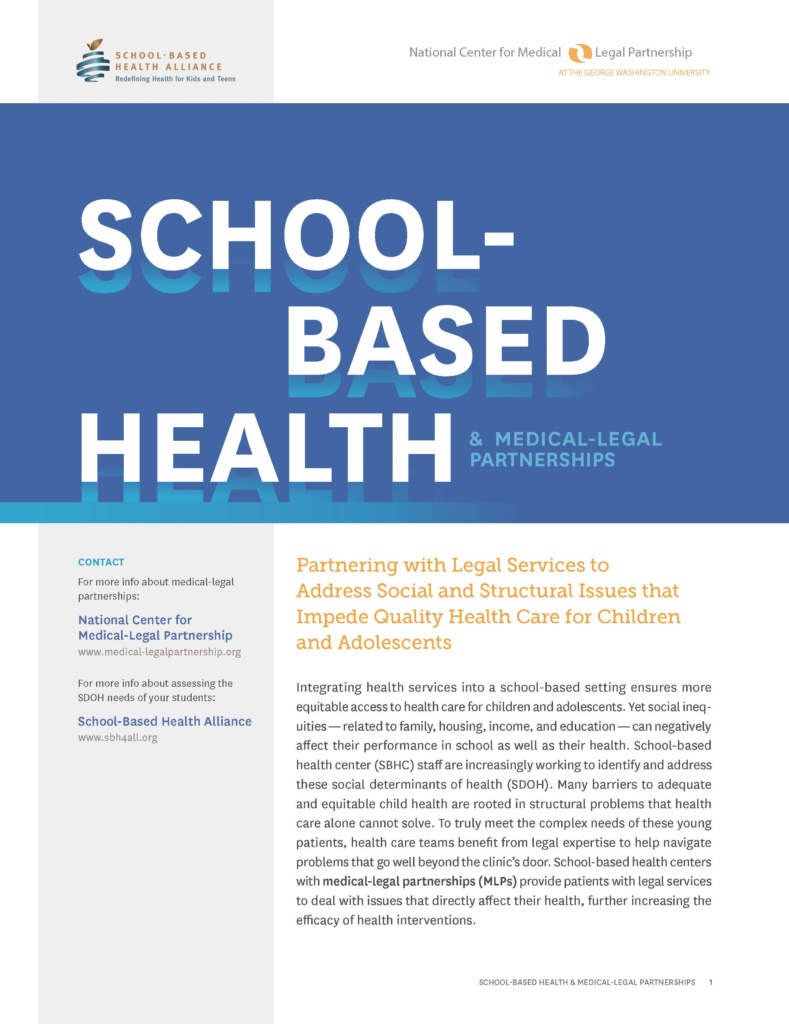 By National Center for Medical-Legal Partnership & School-Based Health Alliance
By National Center for Medical-Legal Partnership & School-Based Health Alliance
Read the full fact sheet, “School-based Health and Medical-Legal Partnerships”
August 2018
Integrating health services into a school-based setting ensures more equitable access to health care for children and adolescents. Yet social inequities—related to family, housing, income, and education—can negatively affect their performance in school as well as their health. School-based health center (SBHC) staff are increasingly working to identify and address these social determinants of health (SDOH). Many barriers to adequate and equitable child health are rooted in structural problems that health care alone cannot solve. To truly meet the complex needs of these young patients, health care teams benefit from legal expertise to help navigate problems that go well beyond the clinic’s door. School-based health centers with medical-legal partnerships (MLPs) provide patients with legal services to deal with issues that directly affect their health, further increasing the efficacy of health interventions. This fact sheet describes common social and legal needs that affect the health of youth, and ways integrated legal services can help meet those needs. It examines medical-legal partnership programs at two school-based health centers and how they operate, and it shares stories of students benefiting from medical-legal partnership services.
